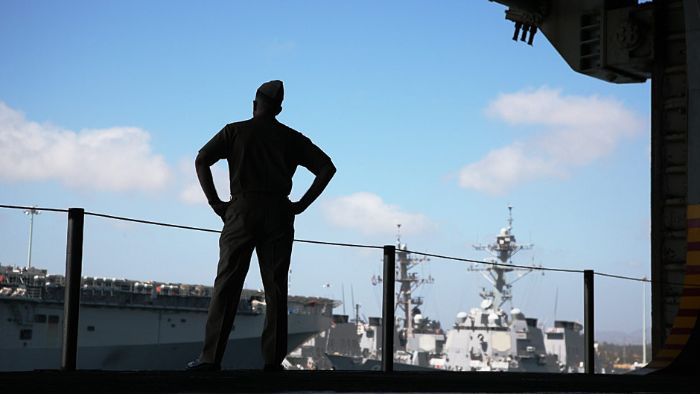A source of support and security for Chaplains Religious Program Specialist
The job of a Religious Program Specialist does not require ordination or involve pastoral counseling. But the important functions these specialists serve and the program support they provide make a world of difference to Navy Chaplains and servicemembers alike.
Job Description
Serving as both an administrative resource and a source of personal security, Religious Program Specialists (RPs) are an important asset to Navy Chaplains.
Primarily, it is the responsibility of the Religious Program Specialist to provide Chaplains with the administrative, technical and logistical support they need to carry out the religious programs and services that servicemembers rely on.
Beyond the clerical functions, there's also the responsibility of ensuring the safety of Chaplains – who are noncombatants and not authorized to bear arms. Religious Program Specialists are trained as combatants, and one of their essential duties is to protect Chaplains.
Specific Responsibilities
As a Religious Program Specialist in the Navy, your responsibilities could include any or all of the following:
- Support clergy of all faiths in the facilitation of religious activities
- Provide physical security for Chaplains during field exercises and in combat environments
- Maintain records, ecclesiastical documents and references for various faith groups
- Operate, manage and maintain religious ministry facilities afloat and ashore
- Assist in the preparation of devotional and religious educational materials and audiovisual displays
- Handle all phases of the logistical support requirements for religious programs aboard ships, at shore stations and hospitals, and for Marine Corps units and other sea service commands
- Operate/maintain libraries and publicize the command’s religious activities
Work Environment
Wherever Chaplains are stationed, Religious Program Specialists are there to assist. Working indoors, in the field, on bases, in hospitals or in combat situations. Literally anywhere in the world.
Your life of serving others could take you from creating worship booklets for Sunday mass at a Naval base chapel to securing the safety of Chaplains in the field. Every day presents new challenges and new opportunities.
Training, Education and Advancement
Not only will you become familiar with religious studies, your training could earn you credit hours for a vocational certificate or a bachelor’s or associate degree.
Qualifications
No college degree is required to work in this field. You should, however, be supportive of clergy and individual religious convictions, be of good moral character and have a strong desire to serve others.
After the Navy
Supporting religious programs and providing personal protection for Navy Chaplains can help prepare you for positions in the civilian world doing anything from administrative management to meeting and convention planning.
Consider Your Service Options.
There are different ways that you can commit to serve in America's Navy. Besides full-time opportunities in Active Duty, part-time Reserve positions are also available in this career area.
 America's Navy
America's Navy

